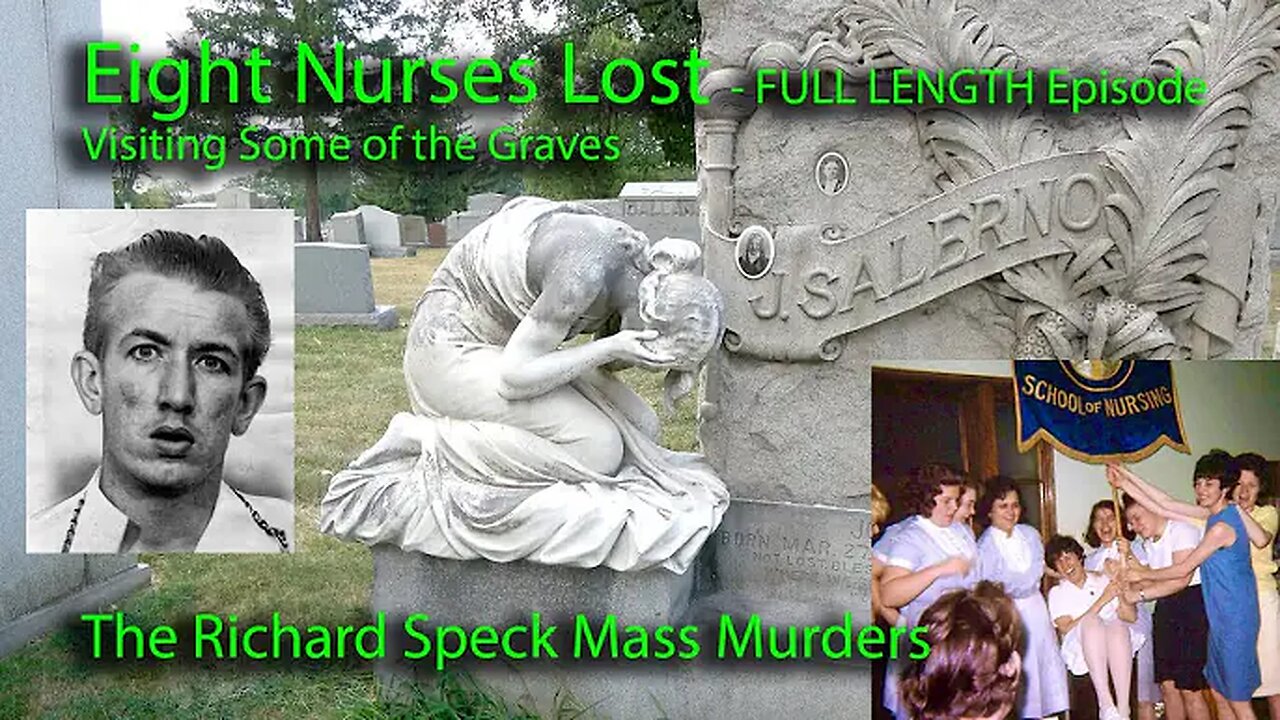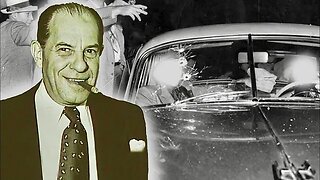Premium Only Content

"8 Nurses Lost - Richard Speck Mass Murders" (4Sep2020) Faces of the Forgotten
THIS STORY:
Richard Speck was an American mass murderer who systematically raped one and tortured and murdered eight student nurses from South Chicago Community Hospital on the night of July 13 into the early morning hours of July 14, 1966.
At 11:00 p.m. on July 13, 1966, Speck broke into the 2319 E. 100th St townhouse in Chicago's Jeffery Manor neighborhood; the townhouse was functioning as a dormitory for student nurses. He entered and, using only a knife, killed Gloria Davy, Patricia Matusek, Nina Jo Schmale, Pamela Wilkening, Suzanne Farris, Mary Ann Jordan, Merlita Gargullo and Valentina Pasion. Speck held the women in a room for hours, leading them out one by one, stabbing or strangling each to death, then finally raping and strangling his last victim, Gloria Davy. One woman, Corazon Amurao, escaped death because she crawled and hid under a bed while Speck was out of the room. Speck possibly lost count or might have known eight women lived in the townhouse but was unaware that a ninth woman was spending the night. Amurao stayed hidden until almost 6 a.m.
Two days after the murders, Speck was identified and then attempted suicide. The Starr Hotel’s desk clerk, where he was renting a room, phoned in the emergency around midnight. Speck was taken to Cook County Hospital at 12:30 a.m. on July 17. At the hospital, Speck was recognized by Dr. LeRoy Smith, a 25-year-old surgical resident physician, who had read about the "Born To Raise Hell" tattoo in a newspaper story. The police were called. Speck was arrested.
On April 15, after 49 minutes of deliberation, the jury found Speck guilty and recommended the death penalty. On June 5, Judge Herbert J. Paschen sentenced Speck to die in the electric chair, but granted an immediate stay pending automatic appeal. The Illinois Supreme Court subsequently upheld his conviction and death sentence on November 22, 1968.
On June 28, 1971, the U.S. Supreme Court upheld Speck's conviction, but reversed his death sentence, because more than 250 potential jurors were unconstitutionally excluded from his jury because of their conscientious or religious beliefs against capital punishment. On November 21, 1972, in Peoria, Judge Richard Fitzgerald re-sentenced Speck to from 400 to 1,200 years in prison (eight consecutive sentences of 50 to 150 years). He was denied parole in seven minutes at his first parole hearing on September 15, 1976, and at six subsequent hearings in 1977, 1978, 1981, 1984, 1987, and 1990.
https://en.wikipedia.org/wiki/Richard...
Original Source Video:
https://m.youtube.com/watch?v=ja7cXSHFkS4&pp=ygUyOCBudXJzZXMgbG9zdCBmdWxsIEVwaXNvZGUgZmFjZXMgb2YgdGhlIEZvcmdvdHRlbiA%3D
-
 15:07
15:07
Tales from the Graveyard
7 days ago"CHICAGO OUTFIT: The Gus Greenbaum Hit" (5Feb2025) Faces of the Forgotten
132 -
 LIVE
LIVE
Alex Zedra
3 hours agoLIVE! Come Play WoT with me!
829 watching -
 LIVE
LIVE
Drew Hernandez
11 hours agoDOGE EXPOSES $2 BILLION SCHEME LINKED TO STACEY ABRAMS?!
2,727 watching -
 1:27:59
1:27:59
Kim Iversen
7 hours agoRFK Jr Declares No More Cheetos on Welfare? | Yale Confirms Long Covid Is Actually Vaccine Injury!
41.6K87 -
 1:08:43
1:08:43
The Charlie Kirk Show
4 hours agoTHOUGHTCRIME Ep. 74 — Charlie's Campus Return? Robo-Butlers? Garden of American Heroes?
46.8K12 -
 1:09:53
1:09:53
Slightly Offensive
4 hours ago $2.65 earnedIs the US Headed for MORE WAR Under TRUMP? | Guest: Scott Horton
22.9K8 -
 58:29
58:29
The StoneZONE with Roger Stone
4 hours agoRoger Stone Hails Confirmation of Kash Patel, Trashes Schiff for Attacks On Patel | The StoneZONE
29K10 -
 48:44
48:44
Man in America
9 hours agoA MASSIVE Global Financial Reset Is Coming—Are You Ready?
19.2K1 -
 1:15:42
1:15:42
Precision Rifle Network
1 day agoS4E5 Guns & Grub - The Best Rifle Under $2000
20.7K5 -
 1:02:54
1:02:54
Glenn Greenwald
1 day agoSouth Korean Economist Ha-Joon Chang on the Economic World Order, Trump's Tariffs, China & More | SYSTEM UPDATE #410
60.6K44